| Srl | Item |
| 1 |
ID:
192233
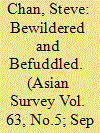

|
|
|
|
|
| Summary/Abstract |
I challenge the dominant Western discourse on China’s rise. This discourse tends to reflect political construction rather than thoughtful scholarship. It is poorly informed by historical evidence and usually evades comparison of China’s conduct with that of other countries, such as the United States, now or in the past. It is also characterized by strong tendencies of groupthink and revisionist scholarship to adjust to prevailing official policies and popular sentiments instead of scrutinizing their validity. This discourse is not only wrong but also dangerous.
|
|
|
|
|
|
|
|
|
|
|
|
|
|
|
|
| 2 |
ID:
057998
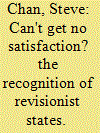

|
|
|
| 3 |
ID:
180365
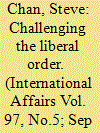

|
|
|
|
|
| Summary/Abstract |
Current discourse on International Relations conflates international order and the interstate distribution of power. Many studies fail to clarify the concept of international order or to provide systematic empirical analysis that compares states' conduct in relation to this order. The prevailing tendency relies instead on rhetorical assertion or definitional fiat to attribute revisionist and status-quo motivations to different countries. For example, power-transition theory claims that rising states are typically revisionist, whereas established states are committed to the status quo. This article presents a contrarian view, arguing that the dominant or established state can be a revisionist. This state is not forever committed to those rules and institutions of international order that it has played a decisive role in fostering. Conversely, a rising state is not inevitably bent on challenging the order that has enabled its ascendance. Revisionism is thus not unique to a rising power; moreover, this state is not destined to be a challenger to international order and an instigator of systemic war as typically depicted in the current literature. I advance these propositions in the context of recent conduct by China and the US, suggesting that whereas China has become less revisionist over time (even while its power has increased), the US has become more so especially during the Trump administration. The major impetus challenging the liberal international order has come more from domestic sources in the West than from China.
|
|
|
|
|
|
|
|
|
|
|
|
|
|
|
|
| 4 |
ID:
079490
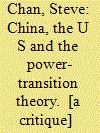

|
|
|
|
|
| Publication |
London, Routledge, 2008.
|
| Description |
x, 197p.
|
| Standard Number |
9780415440240
|
|
|
|
|
|
|
|
|
|
|
|
Copies: C:1/I:0,R:0,Q:0
Circulation
| Accession# | Call# | Current Location | Status | Policy | Location |
| 052904 | 327.51/CHA 052904 | Main | On Shelf | General | |
|
|
|
|
| 5 |
ID:
060976
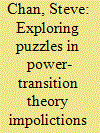

|
|
|
| 6 |
ID:
028175
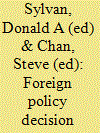

|
|
|
|
|
| Publication |
New York, Praeger, 1984.
|
| Description |
xi, 344p.
|
| Series |
New dimensions in International studies series
|
| Standard Number |
0030697719
|
|
|
|
|
|
|
|
|
|
|
|
Copies: C:1/I:0,R:0,Q:0
Circulation
| Accession# | Call# | Current Location | Status | Policy | Location |
| 025698 | 327.1/SYL 025698 | Main | On Shelf | General | |
|
|
|
|
| 7 |
ID:
066934
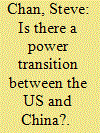

|
|
|
| 8 |
ID:
098469
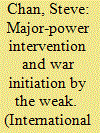

|
|
|
|
|
| Publication |
2010.
|
| Summary/Abstract |
Weak states often instigate war against the strong, sometimes repeatedly so. I explain this phenomenon by recourse to the nature of the contestants' foreign alignments. Pivotal patronage, balanced patronage, competitive patronage and one-sided patronage are offered as ideal types, and five rivalry cases are introduced to highlight the variations in the willingness and opportunity for war initiation by the weaker side and the intensity and duration of the subsequent conflict (should it occur). Whether the pertinent international system is unipolar, bipolar or multipolar distinguishes the alignment types, which in turn point to the concerns for relative gain and credible commitment that motivate the weaker side's decisions.
|
|
|
|
|
|
|
|
|
|
|
|
|
|
|
|
| 9 |
ID:
099143
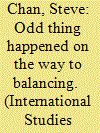

|
|
|
|
|
| Publication |
2010.
|
| Summary/Abstract |
Are East Asian states reacting to China's rise according to balance-of-power expectations? This review discusses the pertinent debate and presents overtime data germane to this question. It raises several issues of theoretical argumentation and historical purview pertaining to this debate, and concludes that the conduct of China's neighbors thus far is anomalous from the traditional balance-of-power perspective.
|
|
|
|
|
|
|
|
|
|
|
|
|
|
|
|
| 10 |
ID:
142196
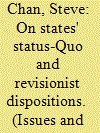

|
|
|
| 11 |
ID:
120212
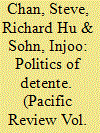

|
|
|
|
|
| Publication |
2013.
|
| Summary/Abstract |
Why have relations across the Taiwan Strait and the 38th parallel on the Korean Peninsula undergone different processes of détente and reversal? We apply the perspective of two-level games to understand the divergent experiences of these two cases of contested sovereignty and regime rivalry. In particular, we call attention to the alignment and misalignment of domestic and international of interests and influences in our analysis, and the dampening and exacerbation of escalating recriminations in comparing these divergent experiences. Three phenomena are especially noteworthy. First, a third party, the US, is critical as a principal agenda setter. Washington's policies are important in abetting or hampering Seoul' and Taipei's domestic politics concerning policies toward their respective rivals. Second, Washington's policies are also important in influencing Beijing' and Pyongyang's policies, which in turn shape and even force responses from Seoul and Taipei. Therefore, policies tend to reverberate not just between domestic and foreign levels, but also across multiple borders in fostering cascades and echoes. Third, the extent to which political rapprochement is accompanied by economic integration is relevant. Extensive economic ties can serve as a brake to tension escalation, and produce resources and incentives that affect politicians' domestic competition and to alter their constituents' perceptions of the potential costs and benefits of pursuing détente and cooperation.
|
|
|
|
|
|
|
|
|
|
|
|
|
|
|
|
| 12 |
ID:
073454
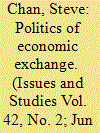

|
|
|
| 13 |
ID:
052173
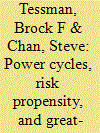

|
|
|
|
|
| Publication |
April 2004.
|
| Summary/Abstract |
The theory of power cycles contends that the growth and decline of national power holds the key to understanding the occurrence of extensive wars. Certain critical points in a state's power trajectory are especially dangerous occasions for such armed clashes. The power cycles of nine major states during the period from 1816 to 1995 are examined, and prospect theory is used to derive expectations about the risk propensity of states during different periods in their power cycle. These expectations are in turn applied to an analysis of deterrence encounters among the major states. Results show that critical points tend to incline states to initiate deterrence confrontations and escalate them to war. Democratic states, however, are less susceptible to these tendencies than authoritarian ones. Results also show that changes in power trajectories do affect the occurrence and outcome of deterrence encounters among the great powers.
|
|
|
|
|
|
|
|
|
|
|
|
|
|
|
|
| 14 |
ID:
187984
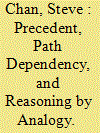

|
|
|
|
|
| Summary/Abstract |
This essay addresses the strategic implications of the Russo–Ukrainian War as it pertains to relations between China and the US, especially with respect to how this conflict may inform prospective developments across the Taiwan Strait. I pursue this question under three topics: the influence of precedents, path dependency, and reasoning by analogy. The war in Ukraine has interrupted Washington’s intention to pivot to Asia to focus on containment of a rising China, and it has also caused Moscow and Beijing to align more closely. Finally, it may have made the direct military intervention of the US in a possible future crisis involving Taiwan less likely.
|
|
|
|
|
|
|
|
|
|
|
|
|
|
|
|
| 15 |
ID:
069113
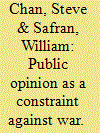

|
|
|
| 16 |
ID:
053723
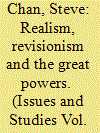

|
|
|
| 17 |
ID:
133965
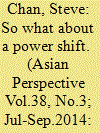

|
|
|
|
|
| Publication |
2014.
|
| Summary/Abstract |
In this article I consider the general idea of power shifts, with specific reference to the discourse on "China's rise." I raise theoretical and policy concerns about the nature, sources, and consequences of China's reemergence as a regional power, and call attention to some analytic tendencies and implicit assumptions featured in this discourse.
|
|
|
|
|
|
|
|
|
|
|
|
|
|
|
|
| 18 |
ID:
103095
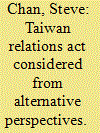

|
|
|